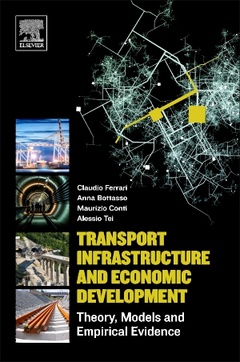Economic Role of Transport Infrastructure Theory and Models
Auteurs : Ferrari Claudio, Bottasso Anna, Conti Maurizio, Tei Alessio

Economic Role of Transport Infrastructure: Theory and Models helps evaluate the economic effects of transport infrastructure investments within a cost-benefit framework for maximum economic impact. The book analyzes the primary empirical approaches used to gauge the economic effects of transport infrastructures, providing in-depth discussions on data issues, input-output techniques, and econometric methodologies. Users will find empirical evidence organized from a transport mode point-of-view, inspiring researchers to conduct comparative analysis for various infrastructure projects. Topics cover infrastructure?s impact on economic growth using theoretical frameworks, including exogenous growth models, endogenous growth models, and new economic geography models.
In addition, readers will also learn tips for conducting infrastructure impact studies and how to improve the effectiveness of infrastructural investments design.
1 - Practitioners and analysts employed in public and private research centers, consultancy and civil service planning offices; 2 – Transportation researchers; 3 – Graduate students in transportation programs
Anna Bottasso is a Professor in the Department of Economics at the University of Genoa, and is a member of the Italian Centre of Excellence for Integrated Logistics. Her expertise includes industrial organization, regulation, transport, and applied economics. She has been published on various topics, such as efficiency and productivity measurement, economics of local public services and network industries, such as water and transport, in journals, including Elsevier’s Transport Policy, and Transportation Research Part A: Policy and Practice.
Maurizio Conti is Associate Professor in the Department of Economics at the University of Genoa, and is a member of the Italian Centre of Excellence for Integrated Logistics. His expertise includes labor economics, industrial organization, regulation, transport and applied economics. He has been published on various topics, such as efficiency and productivity measurement, economics of local public services and network industries, such as water and transport, in journals, including Elsevier’s Transport Policy, and Transportation Research Part A: Policy and Practice.
Alessio Tei is a Lecturer in Maritime Economics at Newcastle University, Newcastle upon Tyne, United Kingdom. His research has focused on the relationship between transport systems and economic growth, inclu
- Explains and evaluates the economic effects of transport infrastructure investments, including direct and indirect, short and long run impact, and local and spillover outcomes
- Provides up-to-date coverage of quantitative techniques and empirical results for transportation and economic impact issues
- Explains the steps for conducting impact studies for proposed infrastructure projects
- Analyzes infrastructure’s role on economic growth through theoretical, methodological and empirical perspectives
- Features case studies describing real-world methods
Date de parution : 10-2018
Ouvrage de 310 p.
15x22.8 cm
Mots-clés :
Constant elasticity of substitution; Cost–benefit analysis; Counterfactual impact evaluation; Counterfactual impact Evaluation; Data Issue; Decision-making tools; Economic benefit; Economic theory; Effective labor; Empirical analysis; Empirical evidence; Ethical concerns; Exogenous and endogenous growth models; GMM; Infrastructural endowment; International transport network strategies; Investment appraisal techniques; Measurement problem; Meta-analysis; Monetary and nonmonetary techniques; Network specification; Neurofibromatosis; New Economic Geography; Public resources; Public–private partnerships; Scale economies; Smart transport; Spatial Econometrics; Spillovers; Transport data; Transport infrastructure; Transport Infrastructures; Transport investment policies; Transport network; Transport planning process; VAR



